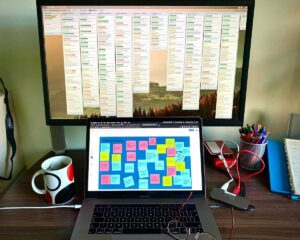23rd Nov 2020
Co-design workshops for Neurocare Knowhow

We’re people who support organisations to make sense of their digital presence. A large part of this is the delivery of workshops with clients and users to help them realise their aspirations. These sessions usually involve us jumping on an early train somewhere to run the workshop. A productive couple of hours will see us swimming in Post-It notes, flip chart paper and loads of great ideas. Exhausted, but still buzzing with excitement and too much caffeine, we then flop onto the next train home.
However, in the age of COVID-19 this isn’t so simple, with every meeting, workshop and call now done through Zoom (other video conferencing platforms are available). This disruption to workshop delivery has been a very positive thing for us. Take for example the recent co-design workshops we’ve just conducted for the Neurocare Knowhow project.
What is Neurocare Knowhow?
Neurocare Knowhow is an online platform for carers. It will provide on-the-go access to learning and support informed by other carers working with those living with neurological conditions. We’re developing this with a range of project partners including University of Sheffield, Devices for Dignity, NIHR Sheffield Biomedical Research Centre and Optical Jukebox, and have been fortunate to be awarded funding by the Ufi VocTech Trust.
Central to the development of the range of learning resources on the platform will be the experiences of people living with neurological conditions and the people who look after them day in, day out. Their insights are vital to the success of the platform and will be key in helping us shape its content. Ensuring a successful start with our co-design workshops is critical to the success of the development.
Planning our co-design workshops
For this project, the enforced shift to online meetings has led to an unforeseen benefit. Typically we would focus on one or two areas of the country, as budget doesn’t often allow for lots of travel around the U.K. This time around, the co-design group we are working with has ended up being based right across the U.K. Add to this the mobility issues of some members and you’ll see the traditional workshop format would have proven difficult for all involved.
So, along with Emma and Cathy from Optical Jukebox (who will be creating much of the video and audio learning content) and Pippa from Devices for Dignity we planned three co-design workshops using the ubiquitous Zoom. One other exciting technical breakthrough for us was the discovery of Google Jamboard. Basically this is an online, collaborative version of the ‘Post-It notes on the wall’ approach. Needless to say this discovery was a revelation and we had great fun capturing the meeting outputs virtually.
Jam-packed jamboards
With a mix of excitement and slight trepidation that the tech would hold up for everyone involved, we began our workshops. The sessions were a mix of:
- People living with a neurological condition
- Carers (both family members and personal assistants)
- Staff from specialist care providers, including Allied Care and Inspire Neurocare.
What was really exciting for us was how much they all embraced this online format. Lockdown has at least provided us all with the opportunity to practice our video conferencing skills.
After the usual icebreakers and scene setting, each workshop focused on the themes of communication and mobility. The groups gave us piles of fantastic insights and experiences which we feverishly collected using jamboards. We were thrilled with the sheer quantity and range of comments that the attendees were able to offer on these areas of their day to day lives. This diversity of information will be critical in ensuring the content we develop will meet the needs of different types of carers, our end users.
Mapping out content
Following our successful workshops, we’re currently in the process of sifting through all of the comments. We’re using Trello to collaborate on this and manage as a team. This process of reflection is really helping us tease out sub-themes, different flows of content and user journeys. The next step for us is to start to shape up how these translate into learning content and the platform navigation.
The future of workshops as we know it
In reflection, we’re pretty chuffed with our online co-design workshops. There were none of the potential tech pitfalls (“can you hear me?” “how do I switch my camera on”? etc.) and all of the different attendees really got into the spirit of the session. We’re looking forward to developing the platform based on the brilliant engagement we got during the workshops.
So would we hold online workshops again in the future you ask? Well the answer would be a resounding “yes”! They’re time efficient, collaborative and immensely productive. It was testimony to the design team’s enthusiasm and skills that we managed to break the ice for such a geographically separated group of people. Online workshops are also far less caffeine intensive and you get to wear your slippers, which can’t be a bad thing!
Read more
Find out how Neurocare Knowhow won UFI VocTech Seed 2020 funding.